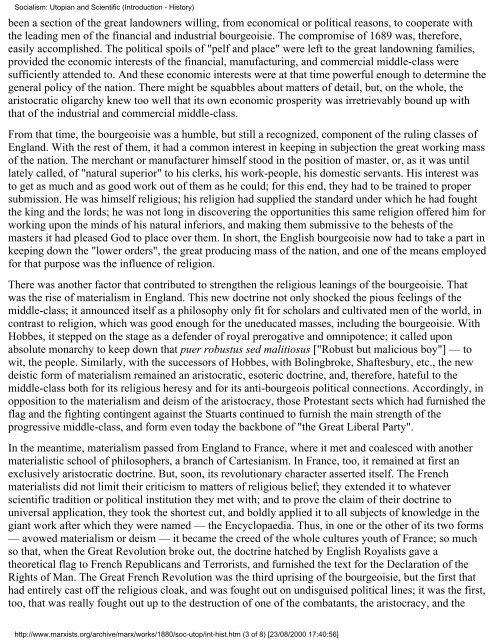Socialism: Utopian and Scientific - MIA
Socialism: Utopian and Scientific - MIA
Socialism: Utopian and Scientific - MIA
Create successful ePaper yourself
Turn your PDF publications into a flip-book with our unique Google optimized e-Paper software.
<strong>Socialism</strong>: <strong>Utopian</strong> <strong>and</strong> <strong>Scientific</strong> (Introduction - History)been a section of the great l<strong>and</strong>owners willing, from economical or political reasons, to cooperate withthe leading men of the financial <strong>and</strong> industrial bourgeoisie. The compromise of 1689 was, therefore,easily accomplished. The political spoils of "pelf <strong>and</strong> place" were left to the great l<strong>and</strong>owning families,provided the economic interests of the financial, manufacturing, <strong>and</strong> commercial middle-class weresufficiently attended to. And these economic interests were at that time powerful enough to determine thegeneral policy of the nation. There might be squabbles about matters of detail, but, on the whole, thearistocratic oligarchy knew too well that its own economic prosperity was irretrievably bound up withthat of the industrial <strong>and</strong> commercial middle-class.From that time, the bourgeoisie was a humble, but still a recognized, component of the ruling classes ofEngl<strong>and</strong>. With the rest of them, it had a common interest in keeping in subjection the great working massof the nation. The merchant or manufacturer himself stood in the position of master, or, as it was untillately called, of "natural superior" to his clerks, his work-people, his domestic servants. His interest wasto get as much <strong>and</strong> as good work out of them as he could; for this end, they had to be trained to propersubmission. He was himself religious; his religion had supplied the st<strong>and</strong>ard under which he had foughtthe king <strong>and</strong> the lords; he was not long in discovering the opportunities this same religion offered him forworking upon the minds of his natural inferiors, <strong>and</strong> making them submissive to the behests of themasters it had pleased God to place over them. In short, the English bourgeoisie now had to take a part inkeeping down the "lower orders", the great producing mass of the nation, <strong>and</strong> one of the means employedfor that purpose was the influence of religion.There was another factor that contributed to strengthen the religious leanings of the bourgeoisie. Thatwas the rise of materialism in Engl<strong>and</strong>. This new doctrine not only shocked the pious feelings of themiddle-class; it announced itself as a philosophy only fit for scholars <strong>and</strong> cultivated men of the world, incontrast to religion, which was good enough for the uneducated masses, including the bourgeoisie. WithHobbes, it stepped on the stage as a defender of royal prerogative <strong>and</strong> omnipotence; it called uponabsolute monarchy to keep down that puer robustus sed malitiosus ["Robust but malicious boy"] — towit, the people. Similarly, with the successors of Hobbes, with Bolingbroke, Shaftesbury, etc., the newdeistic form of materialism remained an aristocratic, esoteric doctrine, <strong>and</strong>, therefore, hateful to themiddle-class both for its religious heresy <strong>and</strong> for its anti-bourgeois political connections. Accordingly, inopposition to the materialism <strong>and</strong> deism of the aristocracy, those Protestant sects which had furnished theflag <strong>and</strong> the fighting contingent against the Stuarts continued to furnish the main strength of theprogressive middle-class, <strong>and</strong> form even today the backbone of "the Great Liberal Party".In the meantime, materialism passed from Engl<strong>and</strong> to France, where it met <strong>and</strong> coalesced with anothermaterialistic school of philosophers, a branch of Cartesianism. In France, too, it remained at first anexclusively aristocratic doctrine. But, soon, its revolutionary character asserted itself. The Frenchmaterialists did not limit their criticism to matters of religious belief; they extended it to whateverscientific tradition or political institution they met with; <strong>and</strong> to prove the claim of their doctrine touniversal application, they took the shortest cut, <strong>and</strong> boldly applied it to all subjects of knowledge in thegiant work after which they were named — the Encyclopaedia. Thus, in one or the other of its two forms— avowed materialism or deism — it became the creed of the whole cultures youth of France; so muchso that, when the Great Revolution broke out, the doctrine hatched by English Royalists gave atheoretical flag to French Republicans <strong>and</strong> Terrorists, <strong>and</strong> furnished the text for the Declaration of theRights of Man. The Great French Revolution was the third uprising of the bourgeoisie, but the first thathad entirely cast off the religious cloak, <strong>and</strong> was fought out on undisguised political lines; it was the first,too, that was really fought out up to the destruction of one of the combatants, the aristocracy, <strong>and</strong> thehttp://www.marxists.org/archive/marx/works/1880/soc-utop/int-hist.htm (3 of 8) [23/08/2000 17:40:56]














![tyf Enf=O=n]lgg](https://img.yumpu.com/47584932/1/190x245/tyf-enfonlgg.jpg?quality=85)

